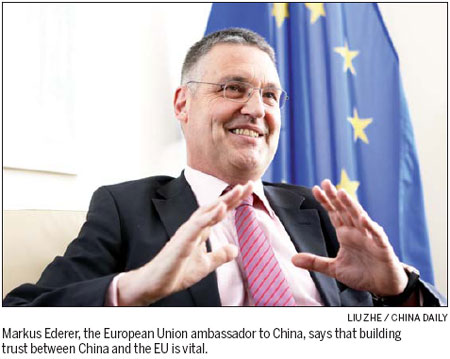Time for trust to triumph
By Joseph Catanzaro ( China Daily Europe ) Updated: 2013-11-15 09:58:39Summit a chance to vastly open up trade and investment between China and Europe, says EU envoy
China and the European Union will begin negotiations for a bilateral investment agreement of unprecedented scale following their summit in Beijing on Nov 20-21, predicts the EU ambassador to China, Markus Ederer.
But the 56-year-old German-born diplomat says the potential scope of any agreement between Beijing and Brussels will be hampered unless both powers work hard to overcome mutual lack of trust.
"One of the main deliverables of this summit is the establishment of mutual trust into each others' viable development paths," Ederer says. "We do have that lack of trust when it comes to the other side's pragmatic, non-ideological approach. I say this is fully mutual. China believes that the EU has ideological agendas, and on the EU side, many people believe that sometimes China is not pragmatic, but ideological."
The Nov 20-21 summit, which marks the 10th anniversary of the EU-China comprehensive partnership, will seek to chart an economic and political roadmap for the second decade of relations.
Opening negotiations that could see the existing 26 individual bilateral agreements between EU member nations and China replaced with a single, comprehensive agreement will be a boon to investors on both sides, Ederer says.
"In addition to the traditional issue of investment protection, it will have components on market access and national treatment. We will establish across the board a simpler and more predictable legal and political environment for mutual investments."
The EU and China will come to the table with similar goals for economic growth, inclusive prosperity and more environmentally sustainable societies, Ederer believes.
The differences will be marked in the perceived obstacles each side thinks need to be removed to attain those goals.
Ederer says greater market access in China is high on the EU agenda. Citing a study by the EU Chamber of Commerce, he says Chinese investors are wary of the heavily regulated EU market. The numbers show the extent of the current, mutual reservations.
Last year, EU-China bilateral trade in goods reached 433.6 billion euros, a figure that saw China edge closer to supplanting the US as the EU's No 1 trading partner.
The problem area though, for both sides, is FDI and ODI. In 2012, EU FDI in China came to only 17.8 billion euros, while China's FDI in the EU was only 3.1 billion euros.
"When you look at our trade relationship, which is really big, and our investment relationship, which is still relatively small, both sides only invest about 2 to 3 percent of their ODI into each other," Ederer says.
"What companies need on both sides of the equation, in Europe and in China, is rule of law, which is if you have a business dispute you cannot settle amicably, there needs to be either an arbitration court or there must be a judge who in an unbiased way hears your case and actually decides in your favor if you are right."
Ederer is optimistic the summit could be the catalyst for this, and much more.
"I believe the best times for the EU-China relationship are still to come, by bringing the investment relationship up to where we are with the trade relationship," he says.
"If we find good solutions for the investment treaty, including more market access, I would not exclude that a successful investment treaty would also open the way for an EU-China free trade agreement."
The summit will open dialogues on topics including rule of law, migration and visa issues, and ways to prevent and diffuse anti-dumping and trade disputes before they escalate to the damaging levels seen recently in a number of cases, some still ongoing.
Ederer is convinced the economies of China and the EU will increasingly need each other, and on a political level, both powers will need to work together to combat global challenges such as food and water security.
"I think we either swim together or we sink together," he says.
"I think even in 10 years we can still quote Wen Jiabao who said 'When we (China) help Europe, we help ourselves.' We in Europe believe the same is true, conversely. If we support China we support ourselves."
Despite conceding that sometimes the EU and China had let "differences overshadow the long-term perspective", Ederer says the progress in diplomatic relations over the past decade has been very good and, as he points out, trade has quadrupled.
Because the EU ironed out many of its economic deficiencies during the financial crisis, and China's leadership is expected to do the same in the wake of the third plenum, the timing is right for a new page in EU-China relations, he says.
"If we work together, we can achieve more than each of us would alone," Ederer says. "It is achievable. You need strategic trust, and for that, you need strategic patience."
josephcatanzaro@chinadaily.com.cn

(China Daily European Weekly 11/15/2013 page28)
|
|
|
|
|
|
|
|
European Weekly
 Gear change
Gear change
'Sustainable development', 'decisive role for markets' are the new buzzwords for Chinese economy.






















